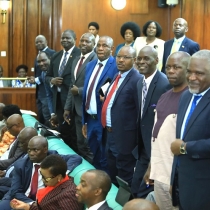
OPINION: Alternative Dispute Resolution in Tax Disputes in Uganda: The Challenges Posed by Informality
By Damalie Tibugwisa
In recent years, there has been a surge in the number of tax disputes in Uganda.
This is attributable to several factors including URA’s aggressive tax assessments, a rise in disputes around tax computation methodologies, vagueness surrounding tax exemptions caused by the constant and rapid amendments to tax laws, poor record-keeping by taxpayers, increased taxpayer activism and general economic hardships.
A tax dispute generally arises where there is a disagreement between the taxpayer and URA on the tax payable.
Traditionally, the adversarial system of dispute resolution, for example, court has been the most commonly used approach.
However, this system poses several challenges including; increase in case backlog, affects government revenues, inhibits voluntary tax compliance, affects stakeholder relationships and also affects foreign direct investment.
It is also time-consuming, costly and creates unpredictability.
Accordingly, the efficient, expedient and amicable resolution of tax disputes at the earliest, is the best option for all stakeholders and this is best achieved through Alternative Dispute Resolution “ADR” mechanisms.
It is no wonder, that in the recent past, URA has proactively encouraged resolution of disputes through voluntary disclosure and other ADR mechanisms.
However, these have had several shortfalls presented by the absence of a clear and formal regulatory framework for ADR.
Thankfully, The Tax Procedures Code (Amendment) Act, 2021 which commenced on 1st July, 2021 introduced ADR for tax disputes.
In this article, I analyse and evaluate the different ADR approaches currently engaged by URA in dispute resolution of tax matters.
I also make recommendations for the pertinent issues that must be addressed by the regulatory framework for ADR.
In 2019, S. 66 of the Tax Procedures Code Act was amended by introducing and adding Section 66(1a) on voluntary disclosure.
The said provision is to the effect that: “Where a person has committed an offence under a tax law other than S.63 of the Act, and that person voluntarily discloses the commission of the offence to the Commissioner, prior to the commencement of court proceedings, the Commissioner may enter into an agreement with the offender to compound the offence if the offender agrees to pay to the Commissioner the outstanding unpaid tax and that person shall not be required to pay any interest or fine due.”
Backed by this provision, URA has since issued notices touting and inviting taxpayers to voluntarily disclose self-incriminating information in exchange for waiver of interest or penalty due.
Of course, as expected, URA did not receive much participation and response to these notices from the tax payers on the following grounds:
1. From a legal point of view, Section 66(1a), waives the presumption of innocence, which is a constitutionally guaranteed and non derogable right.
The provision is couched in terms that victimize the taxpayer and pronounce him/her guilty without consideration to the circumstances relating to the alleged offence.
By subscribing to voluntary disclosure, the taxpayer literally strips himself bare and must incriminate himself almost in absolute terms to be able to take advantage of the waiver of interest and penalty.
The legality of the imposition of a penalty before conviction by Court was the subject of the High Court’s consideration in the case of Sande Pande Ndimwibo v Uganda Revenue Authority HCCS No. 424 of 2014 where Honourable Justice Madrama Christopher [as he then was] held that: “…the person who among other things is presumed innocent until convicted cannot pay the penalty prescribed for a convict…In other words, penal tax cannot be imposed without a conviction... Anything done in violation of an article of the constitution is a nullity and of no effect … Section 66(1a) therefore inherently creates barriers and disincentives for taxpayers to participate in voluntary disclosure."
2. Relatedly, the Commissioner’s waiver of interest and the fine is discretionary. What this means, is that there is no guarantee that upon incriminating oneself, the taxpayer automatically obtains the waiver.
Instead of granting the waiver, the Commissioner could use the said disclosure to prosecute the taxpayer. Who would subject themselves to such risk!?
3. Evidently, the scales are so imbalanced against the taxpayer and the inequality posed by this provision is very apparent. The taxpayer must surrender in totality to the process whilst URA can pick and choose how it responds.
4. Moreover, the provision, does not in any away offer support to the taxpayer in respect of confidentiality and limitation of liability for information shared in pursuit of the said provision which unfairly prejudices the taxpayer.
5. Furthermore, the resultant agreement is not as binding as a court order and could subsequently be inquired into by other parties which would render the sacrifice worthless.
It is therefore easy to see why the voluntary disclosure mechanism was not attractive to taxpayers.
Due to public demand and upon the realization of the ineffectiveness of voluntary disclosure, in 2020, the Tax Procedures Code Act was amended under Section 40C to prescribe that: “Any interest and penalty outstanding as at 30th June 2020 is waived.”
This provision had the effect of making S. 66 (1a) of the Tax Procedures Code Act on Voluntary Disclosure redundant.
There remains no incentive for a taxpayer to disclose self-incriminating information to URA when Section 40C waived interest and penalties. It’s now a ‘catch me if you can’ kind of situation.
Accordingly, although voluntary disclosure was supposed to come in handy in aiding dispute resolution, it did quite achieve the objective.
Besides voluntary disclosure, there isn’t any other specific provision on the use of ADR for tax disputes in tax laws.
Generally, any taxpayer aggrieved by a tax decision may file an objection to the Commissioner which may be allowed completely, partially or maybe disallowed.
If the taxpayer is still not satisfied with the decision they may seek an administrative review which is an internal mechanism or file a review application with the Tax Appeals Tribunal.
The challenge with filing at the Tax Appeals Tribunal is that the taxpayer is required to pay a mandatory 30% of the sum in dispute or not in dispute whichever is greater.
The Tax Appeals Tribunal has a mediation option to the parties which has gone a long way in enabling settlements.
But again, this is only available to taxpayers who have complied with the filing requirements.
The 30% requirement has absolutely been a barrier to access to justice especially for small and medium enterprises.
No wonder, majority of the cases handled by the tribunal are lodged by large taxpayers who can fairly afford the entry requirements.
As a result, several taxpayers remain disgruntled and dissatisfied without redress. Many resort to constantly petitioning the “powers that be” to intervene which is unsustainable.
Accordingly, as earlier noted, URA is now more accommodative and embracing of ADR for settlement of tax disputes which is very commendable.
However, the informality presented by the lack of a clear regulatory framework for ADR has also had several shortcomings and challenges.
The challenges I share in this article resulting from the informal dispute resolution mechanisms currently at play, are based on my personal experience as a tax practitioner and may not entirely represent everyone’s experience with the Authority.
Also, the intention behind my sharing is not to vindicate or spite anyone or the institution, but to cause reform and inform policy.
I appreciate URA’s initiatives in this regard and believe more and better can be done.
The current challenges posed by the informality in ADR in tax matters include the following:
1. At times, taxpayers get prejudiced by URA’s staff politics and persona especially where there are several individuals or departments involved.
Sometimes individuals egos, perceptions, misgivings about each other get in the way of negotiations.
In one case, I handled, the officer who generated the assessments did not want to cooperate because it appeared she viewed the engagements to reduce the tax liability as an affront on her competence and made the process drag for long.
Given the position she held, the rest of the team couldn’t really push her to do her part expediently.
2. Tax liability is not a contractual issue or a matter of concession, it is a creature of statute and ideally, the only settlement that can and should ordinarily be reached is that which is squarely based on the law.
In reality though, since settlements generally give room for compromises and seek to achieve a win-win situation for all parties, sometimes, the decision made may deviate from the legal liability usually in favour of URA.
Rarely will a settlement be reached where the taxpayer is negotiating for zero liability. It is easier to obtain a settlement when the taxpayer is willing to pay a portion of the disputed tax, even if in principle they have no liability.
3. Although settlements are ordinarily supposed to ensure expeditious settlement of the dispute, given their discretionary nature, occasionally, the parties involved do not treat the matter with the sense of urgency and importance that is usually accorded to court directions.
4. At times, there is apparent inequality and prejudice exhibited by URA officials. There is a tendency for some officers to act like they are doing the taxpayer a favour.
The inequality is also evident from the information asymmetry. URA is always asking for information from the taxpayer but is usually reluctant to share information with the taxpayer.
The taxpayer is treated with suspicion, prejudgment and mistrust (sometimes understandably).
For some officers, the taxpayer is presumed guilty until proven innocent and when this happens, there is no objectivity exercised in dealing with the issues at hand.
5. The absence of a third party to act as a mediator in the dispute sometimes defeats settlement possibilities especially where there is a deadlock.
6. Relatedly, the use of experts on the subject who could offer support is limited.
For example, where it’s a question of law and both parties do not have a lawyer on their team, it is sometimes, difficult to push a legal position that may even be supported by case law. In such cases, there is reluctance to give the issue importance.
7. The disjointedness in the different URA departments also poses a challenge.
It is not uncommon for example to have a position reached with one department and not recognized or known to another and the taxpayer gets caught in a mouse and cat game, being tossed from one person to another, just to prove and confirm a settlement which should ordinarily and automatically be recognized and respected by another department.
There is generally a lack of harmony. The above challenges are posed by the absence of a clear and robust framework for ADR.
It is therefore imperative and timely that the Tax Procedures Code (Amendment) Act, 2021 introduced ADR and prescribes Regulations on the matter.
Under the Act formally introduced the provision to the effect that a taxpayer who is dissatisfied with the decision of the Commissioner may apply to the Commissioner to resolve the matter using ADR.
The provision further empowers the Minister to make regulations relating to ADR. These Regulations are yet to come into force.
The Regulations that will be made, should address the aforegoing concerns. The ADR provisions should clearly stipulate the different forms of ADR mechanisms including Mediation, Arbitration and Conciliation and the circumstances warranting any of the methods.
The provisions should also prescribe aspects like fees, timelines, duties and rights of parties including transparency and confidentiality obligations.
The role of third parties including mediators, arbitrators and experts should be defined and clarified. It is also important that the Regulations prescribe the nature of disputes eligible for ADR some of which could include disputes around transfer pricing, capital or revenue valuations, disputes which are complex, controversial and would ordinarily take long.
The Regulations must also prescribe for governance issues.
There must be harmonization with the existing dispute resolution mechanisms to avoid a conflict of laws.
Overall statutory provision for ADR in tax disputes is long overdue and is a necessity not an option.
Conclusion
Alternative Dispute Resolution is the most recommended way of resolving tax disputes with a global recommendation that 80% of all tax disputes be resolved by way of ADR.
Countries like South Africa are said to be at 66% attainment whilst Uganda lags far behind.
The benefits of ADR are immense but these may not be realized if there is no clear and robust legal framework for deploying such mechanisms.
In fact, as demonstrated above, ADR mechanisms if not well structured could promote discrimination and inequality, cause abuse of dominant position, abuse of transparency and confidentiality coupled with stakeholder dissatisfaction and disgruntlement.
Accordingly, although the drive by URA to encourage amicable resolution of disputes is applauded, the challenges posed must be addressed if the true purpose and intention of the drive is to be achieved.
Similarly, the amendment to the law to provide for ADR is going to be a game-changer in tax dispute resolution.
However, whether such change is productive or counterproductive, will entirely depend on how comprehensive, articulate, objective, balanced and customized the said framework is.
Particularly, it will be a relief and an answered call for justice if the fees payable to lodge disputes under ADR are fairer and considerate to taxpayers.
The current 30% requirement at the Tax Appeal Tribunal is unconscionable and burdensome to the taxpayer.
It is inconceivable that the highest court in this country has upheld it. I hope that the ADR regulatory framework will restore hope to taxpayers and bring justice to all deserving.
The writer is a commercial lawyer and is the founder and managing partner of M/s Tibugwisa and Co. Advocates.
Links
- 142 views










































Join the conversation